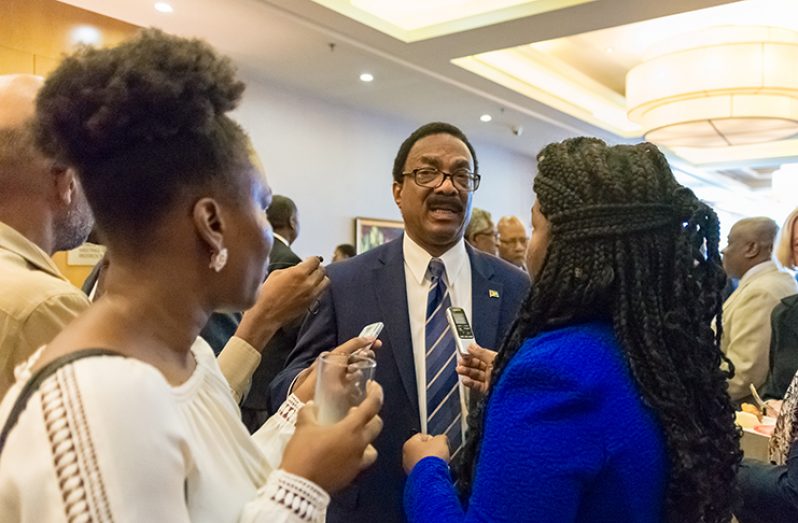JUST when Guyana thought it was one step closer to establishing its own law school, it is now being told that the feasibility study it submitted is not in compliance with the treaty that established the Council of Legal Education (CLE).
The hammer dropped on Friday when CLE Chairman Reginald Armour announced that the Government of Guyana and its joint-venture partners, the Law School of the Americas (LCA) and the University College of the Caribbean (UCC), have been asked to revisit the study.

“We have asked for a better feasibility study,” Armour told reporters on the margins of the opening ceremony of the CLE meeting at the Guyana Marriott on Friday.
Guyana’s Attorney-General and Legal Affairs Minister Basil Williams, on July 4, 2018 submitted a copy of the feasibility study to the CLE for consideration. That study was examined by a sub-committee of the Council of Legal Education, and it was during that examination that several loopholes were detected.
According to the CLE Chairman, who also chairs the sub-committee, there were three primary concerns.
“One, the feasibility study is not treaty-compliant; it does not fit within the treaty that the Council of Legal Education operates under,” Armour explained.
According to Article 1, Section 3 (b) of The Treaty establishing the Council of Legal Education, the Council is mandated “to establish, equip and maintain law schools, one in Jamaica, one in Trinidad and Tobago, and in such other territories as the Council may from time to time determine, for the purpose of providing post-graduate professional legal training.”
The second major concern, Armour disclosed, is that the feasibility study does not satisfy the quality assurance that the CLE requires.
“Thirdly, we would need to see a curriculum; we need to see a curriculum,” he said.
CONTINUED DISCUSSIONS
A full report on the proposed law school was presented to the full Council on Friday by the sub-committee, and according to Mr Armour, a timetable would likely be set up for continued discussions with Guyana and its joint-venture partners, LCA and UCC.
He, however, stopped short of indicating whether Guyana would be given the green light if it provides the council with the required information. All he said was, “When those things are submitted, we will look at them.”

But for Guyana’s AG, it is simply a matter of providing the Council of Legal Education with additional information, rather than doing a new study altogether.
He explained that it was the intention of the government and its partners to utilise the Hugh Wooding Law School’s curriculum, but it was not included in the document that was submitted to the CLE, and it will be now.
On the issue of quality assurance, Minister Williams told reporters that additional information was requested, and will be provided. The attorney general said the partners in Jamaica have already sent some of the information that is required.
Addressing the concern that the feasibility study is not in compliance with the treaty, the attorney general pointed out that while Article 1, Section 3 (B) of the agreement establishing the Council of Legal Education identified Jamaica and Trinidad and Tobago, it creates provisions for other law schools to be established.
He noted that it was under the said agreement that the Eugene Dupuch Law School was established in The Bahamas, and stressed that it is necessary for Guyana to have its own law school.
Ahead of the meeting on Friday, the CLE sub-committee met with the attorney general and officials from the LCA and UCC, including LCA Chairman Courtney Wynter at the AG’s Chamber on Tuesday.
MAKE A STRONG CASE
Like the attorney general, Wynter and his partners continue to make a strong case for Guyana to be granted the necessary approval to establish its own law school; one that would be recognised by the CLE.
“For years the students of Guyana and other parts of the Caribbean have been disenfranchised; one, because of cost, and two, because of the allocation into the Norman Manley or the three existing law schools,” Wynter said.
“And so, because of the space availability of the three existing law schools, we have Caribbean nationals who are struggling to continue their legal education,” he added, noting that the proposed JOF Haynes Law School will help to meet the demand.
The JOF Haynes Law School, when constructed, will be located at the University of Guyana (UG). The state-of-the-art facility is expected to cost $6M, and with the Guyana Government having already secured the land, its private partners are in line to finance the project.




.png)









